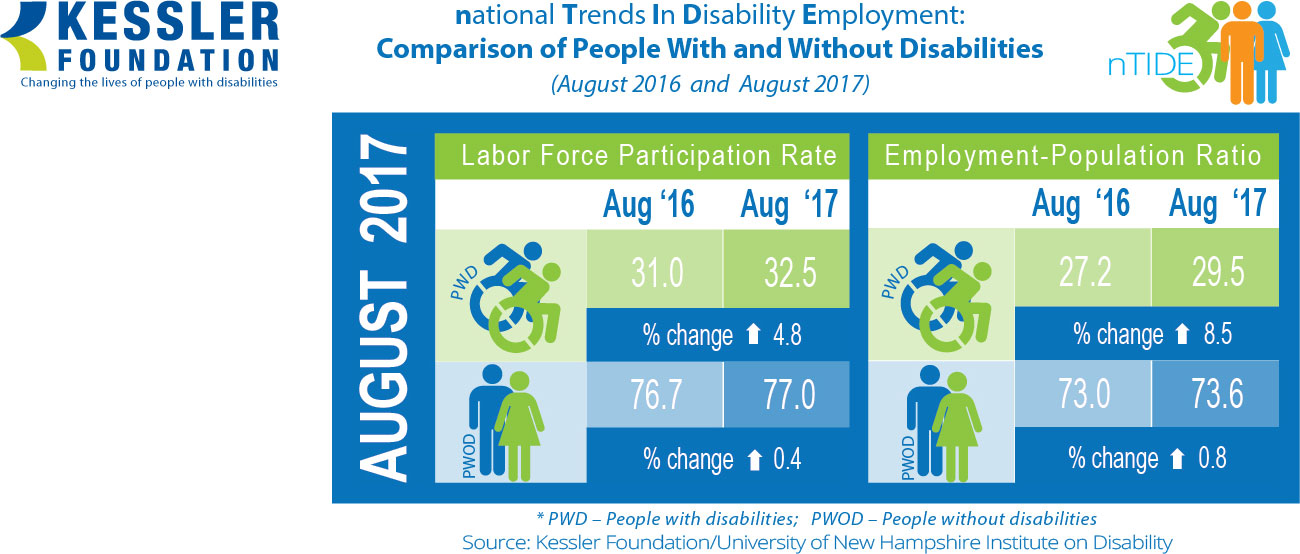Kessler Foundation and University of New Hampshire’s Institute on Disability release national Trends in Disability Employment (nTIDE) Report – Monthly Update
East Hanover, NJ – September 1, 2017 – As we celebrate Labor Day, the job news remains upbeat for Americans with disabilities, according to today’s National Trends in Disability Employment – Monthly Update (nTIDE), issued by Kessler Foundation and the University of New Hampshire’s Institute on Disability (UNH-IOD). For the population with disability, the trend has now reached 17 consecutive months. Accessible public transportation systems, such as buses and trains, provide pathways to independence for people with disabilities. Targeted training programs can help people with disabilities learn to use public transportation safely and efficiently, expanding their access to employment, education, health care, and community activities.
In the Bureau of Labor Statistics (BLS) Jobs Report released Friday, September 1, the employment-to-population ratio for working-age people with disabilities increased from 27.2 percent in August 2016 to 29.5 percent in August 2017 (up 8.5 percent; 2.3 percentage points). For working-age people without disabilities, the employment-to-population ratio also increased from 73 percent in August 2016 to 73.6 percent in August 2017 (up 0.8 percent; 0.6 percentage points). The employment-to-population ratio, a key indicator, reflects the percentage of people who are working relative to the total population (the number of people working divided by the number of people in the total population multiplied by 100).
“The proportion of people with disabilities working continues to improve for the seventeenth consecutive month,” noted John O’Neill, PhD, director of employment and disability research at Kessler Foundation. “While this prolonged stretch of gains is encouraging, we need to remember that the gap in employment between people with and without disabilities is still a large one,” he added.
The labor force participation rate for working-age people with disabilities increased from 31 percent in August 2016 to 32.5 percent in August 2017 (up 4.8 percent; 1.5 percentage points). For working-age people without disabilities, the labor force participation rate also increased from 76.7 percent in August 2016 to 77.0 percent in August 2017 (up 0.4 percent; 0.3 percentage points). The labor force participation rate is the percentage of the population that is working or actively looking for work.
“Transportation is often cited as a major barrier by people with disabilities, especially those who are seeking employment,” noted Debra Brucker, PhD, research assistant professor at UNH. “Yet, we see evidence that this is a barrier that can be successfully overcome, according to the 2015 Kessler Foundation National Disability & Employment Survey,” she added.
Transportation training programs and services, such as the New Jersey Travel Independence Program (NJTIP) @ Rutgers University, are helping people use their local transportation systems, safely and independently. “Our hands-on training program expands the sphere of mobility for people with disabilities in providing them with the skills, experience, and confidence they need to travel on their own,” said Karen Alexander, Managing Director at NJTIP @ Rutgers University. “More than 400 individuals have completed our program,” she noted, “and two-thirds of these graduates have become regular transit users. Being able to navigate public transportation independently opens up their options for employment and education, as well as greater enjoyment in the many activities offered in our communities.”
“Because access to transportation is a national issue, we understand the need to look at ‘the big picture’,” emphasized Alexander. “At NJTIP we also participate in transportation research, provide information on available resources, and work to increase the mobility options available to all people.”
In August 2017, among workers ages 16-64, the 4,641,000 workers with disabilities represented 3.2 percent of the total 144,371,000 workers in the U.S.
The next nTIDE will be issued on Friday, October 6, 2017.
Join our nTIDE Lunch & Learn series today, September 1, at 12:00pm Eastern. This live broadcast, hosted via Zoom Webinar, offers attendees Q&A on the latest nTIDE findings, provides news and updates from the field, as well as invited panelists to discuss current disability-related findings and events. Donna Smith with Easterseals Project Action Consulting, will join Drs. Brucker and O’Neill, and Denise Rozell, policy strategist at AUCD, to discuss today’s findings. You can join live, or watch the recordings at: www.ResearchonDisability.org/nTIDE.
NOTE: The statistics in the nTIDE are based on Bureau of Labor Statistics numbers, but are not identical. They are customized by UNH to combine the statistics for men and women of working age (16 to 64). NTIDE is funded, in part, by grants from the National Institute on Disability, Independent Living and Rehabilitation Research (NIDILRR) (9ORT5022 and 90RT5017) and Kessler Foundation.
About Kessler Foundation
Kessler Foundation, a major nonprofit organization in the field of disability, is a global leader in rehabilitation research that seeks to improve cognition, mobility, and long-term outcomes — including employment — for people with neurological disabilities caused by diseases and injuries of the brain and spinal cord. Kessler Foundation leads the nation in funding innovative programs that expand opportunities for employment for people with disabilities. For more information, visit www.KesslerFoundation.org.
About the Institute on Disability at the University of New Hampshire
The Institute on Disability (IOD) at the University of New Hampshire (UNH) was established in 1987 to provide a coherent university-based focus for the improvement of knowledge, policies, and practices related to the lives of persons with disabilities and their families. For information on the NIDILRR-funded Employment Policy and Measurement Rehabilitation Research and Training Center, visit www.ResearchonDisability.org.
For more information, or to interview an expert, contact:
Carolann Murphy, 973.324.8382, CMurphy@KesslerFoundation.org
Laura Viglione, 973.323.3675, LViglione@KesslerFoundation.org
